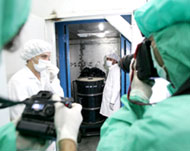EU leaders say Iran talks are dead
The European Union’s three major powers have agreed that talks with Iran have reached a “dead end” saying Tehran should be taken before the UN Security Council for possible sanctions over its nuclear programme.

“We will be calling for an extraordinary IAEA board meeting,” Germany’s foreign minister Frank-Walter Steinmeier said.
“Our talks with Iran have reached a dead end,” he said, speaking after talks in Berlin on Thursday with his French and British counterparts.
The emergency meeting was held to thrash out the international community’s response to Iran‘s resumption of sensitive nuclear fuel activities.
Before the meeting, Jack Straw, Britain’s foreign minister, said there was little doubt the three would be pushing for firm action against Iran.
“For two and a half years, we’ve been working with Iran and the rest of the international community to bring Iran into compliance with its very clear obligations not to do anything that leads to suspicions they are developing a nuclear weapons capability,” he said.
A senior EU official, who briefed reporters on condition of anonymity, said the four would speak by telephone during the meeting with Condoleezza Rice, the US secretary of state.
Iranian defiance
 |
|
Iran’s says its nuclear program is |
The meeting came as Iran vowed defiance following a furious international response after it lifted seals at nuclear sites in order to resume research on uranium enrichment.
A diplomat in Vienna said Iran had now finished removing seals at three nuclear plants, including Natanz.
Mohamed ElBaradei, the IAEA’s director, has said Iran plans to start “small-scale” uranium enrichment at Natanz, although a Western diplomat said it would likely take weeks to get the equipment up and running.
The Europeans have been negotiating with the backing of the United States, which has been pushing for Tehran to be reported to the Security Council.
Rejection
A European diplomat said Britain, France and Germany would declare at the Berlin meeting that Iran‘s decision to resume nuclear activities was a “unilateral rejection” of two years of talks with the EU troika.
Dick Cheney, the US vice-president, told Fox News radio on Wednesday: “I think the next step will be probably to go before the UN Security Council.”
If that happens, Cheney said, sanctions “would be probably the number one item on the agenda.”
A last-ditch round of European-Iranian talks had been scheduled for 18 January, but a senior German official said the Europeans cannot continue negotiating with Iran on its nuclear programme unless it pledges not to enrich uranium.
Gernot Erler, the deputy foreign minister argued, however, that a Security Council referral and the threat of sanctions could “lead to an escalation that can get out of control.”
Iranian triumph
Iran vowed to press ahead with the nuclear programme.
|
“With wisdom we will get our rights, and if they create any trouble for us, they will regret it in the end and Iran will emerge triumphant” |
Mahmoud Ahmadinejad, the Iranian president, said: “Unfortunately, a group of bullies allows itself to deprive nations of their legal and natural rights.
“I tell those superpowers that, with strength and prudence, Iran will pave the way to achieving peaceful nuclear energy. The Iranian nation is not frightened by the powers and their noise.”
Akbar Hashemi Rafsanjani, Iran‘s former president, now head of Iran‘s top political arbitration body, was even more forthright.
He said: “With wisdom we will get our rights, and if they create any trouble for us, they will regret it in the end and Iran will emerge triumphant.”